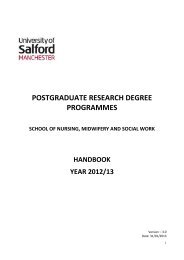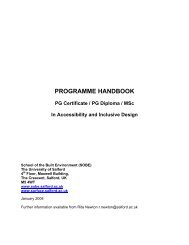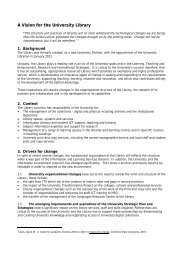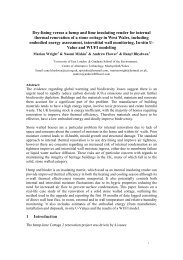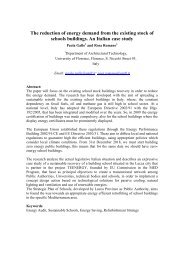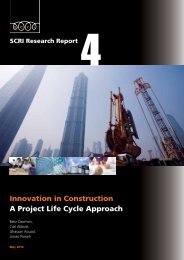RISE May-June 2009 - University of Salford
RISE May-June 2009 - University of Salford
RISE May-June 2009 - University of Salford
Create successful ePaper yourself
Turn your PDF publications into a flip-book with our unique Google optimized e-Paper software.
<strong>RISE</strong>! Research Innovation and Internationalisation News<br />
THE ENERGY THEME<br />
Pr<strong>of</strong>essor Keith Ross, Centre Director, Institute for Materials Research, and Pr<strong>of</strong>essor Steve Curwell, Sustainable Urban Development,<br />
Institute <strong>of</strong> Built Environment.<br />
The significance <strong>of</strong> energy to the future <strong>of</strong> mankind cannot be<br />
exaggerated. The population <strong>of</strong> the Earth has reached a level that it could<br />
nowhere near be fed without the extensive use <strong>of</strong> energy in<br />
agriculture and we have become used to the lavish use <strong>of</strong> energy in the<br />
support <strong>of</strong> our lifestyle. However, whether we consider the<br />
anthropomorphic rise <strong>of</strong> CO 2 levels in the atmosphere, giving rise to Global<br />
Warming, or alternatively consider the imminence <strong>of</strong> “Peak Oil” and the<br />
consequences to humanity <strong>of</strong> an inexorable rise in fossil fuel costs and the<br />
associated transfer <strong>of</strong> financial wealth to the Middle East and Russia, it is<br />
clear that we have to face very significant changes in the way we use<br />
energy. These necessary changes create a major challenge to the research<br />
community, internationally and nationally. Training will also be essential to<br />
produce the number <strong>of</strong> specialists in the new areas.<br />
Governments are meeting this challenge by allocating considerable<br />
resources to research in the area. It is therefore natural that energy should<br />
become one <strong>of</strong> the themes <strong>of</strong> the <strong>University</strong>.<br />
The <strong>University</strong> <strong>of</strong> <strong>Salford</strong> already plays a considerable role in energy<br />
research, in the development <strong>of</strong> new technologies, the observation <strong>of</strong><br />
global changes resulting from climate change, the development <strong>of</strong><br />
energy savings technologies in the Built Environment and the<br />
observation <strong>of</strong> social attitudes to these necessary changes. In the<br />
development <strong>of</strong> new technologies, we are active in wind power and<br />
related meteorological and acoustic phenomenon, in hydrogen energy and<br />
associated developments in hydrogen/fuel cell and battery cars and in<br />
materials problems related to nuclear energy.<br />
All this work on advanced materials is supported by a considerable effort<br />
in ab initio modelling. We also have various important existing facilities<br />
such as the radio chemistry laboratories in Cockcr<strong>of</strong>t. Global changes<br />
related to climate change are inferred from satellite data. Research in the<br />
Built Environment relates to the adoption <strong>of</strong> improved thermal insulation,<br />
smart devices for energy saving and architectural design features that<br />
minimise the need for additional space heating and cooling. Retr<strong>of</strong>itting <strong>of</strong><br />
insulation to the existing housing stock is also important. We also have<br />
major research efforts into the analysis <strong>of</strong> social attitudes, for instance into<br />
the popular response to the introduction <strong>of</strong> hydrogen energy on a broad<br />
scale. Our current research portfolio (grants awarded since 2000) amounts<br />
to £7 million, which is spread over the research areas referred to above.<br />
When it comes to considering how the <strong>University</strong> might develop its<br />
research within the energy theme, the proposed philosophy is to invest in<br />
new research activities in areas adjacent to our existing research strengths,<br />
thus avoiding overlap but gaining from existing reputations and facilities.<br />
The specific suggestions are:<br />
(1) investment in nuclear energy, both fission and fusion, and both at the<br />
teaching and research levels. This would build on existing research<br />
strengths and develop related teaching programmes to meet the<br />
urgent need for new nuclear engineers;<br />
(2) a senior appointment in the area <strong>of</strong> new low carbon<br />
energy technologies (batteries, hydrogen, wind power etc.);<br />
(3) further development in the area <strong>of</strong> energy technology in the built<br />
environment;<br />
(4) a senior appointment in the socio-economic aspects <strong>of</strong> new energy<br />
technologies.<br />
... we have to face<br />
very significant<br />
changes in the way<br />
we use energy ...<br />
In each <strong>of</strong> the above areas, a business plan would be developed,<br />
implying an investment <strong>of</strong> the order <strong>of</strong> several millions, to encompass the<br />
parallel development <strong>of</strong> research and teaching, with the objective <strong>of</strong><br />
covering its additional costs in a period <strong>of</strong> around five years.<br />
29





